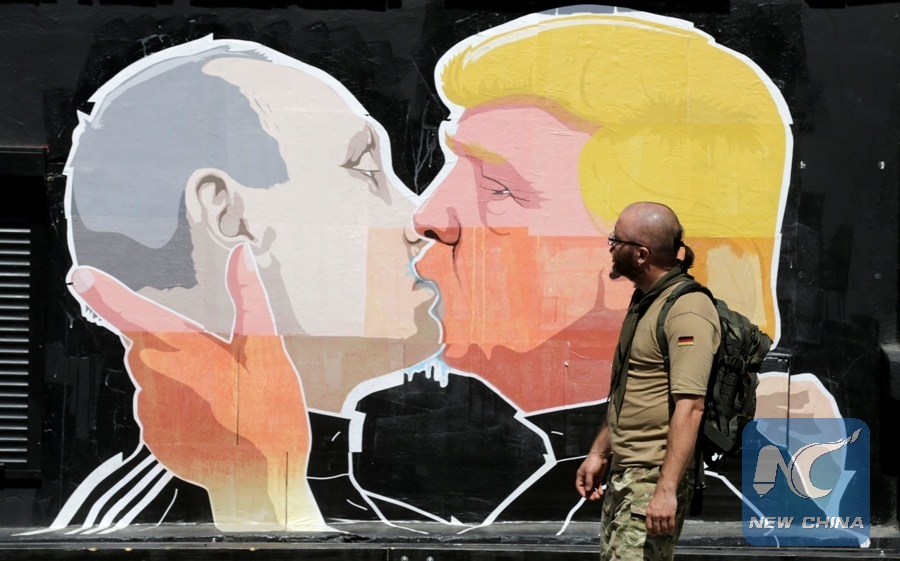
A man walks past a graffiti depicting U.S. Republican presidential Donald Trump (R) and Russia's President Vladimir Putin in Vilnius, Lithuania, June 1, 2016. (Xinhua/REUTERS)
By Matthew Rusling
WASHINGTON, Dec. 10 (Xinhua) -- U.S. President-elect Donald Trump does not believe Russia interfered in U.S. elections in a bid to get the brash billionaire elected, but that will not stop U.S. Congress from launching a probe into whether the Kremlin tried to influence the 2016 race for the White House, experts said.
Trump shocked the world last month when he proved wrong the vast majority of experts and polls that predicted he would lose to rival Hillary Clinton of the Democratic Party.
The election season was marked by a number of releases of information by the website Wikileaks, including private emails from the Clinton campaign. Those emails brought some of Clinton's embarrassing secrets to light.
The Clinton campaign and others have accused Russia of being behind the Wikileaks, in an effort to help get Trump elected, as the New York mogul has said he would cut a deal for better relations with Russia if elected.
On Friday, a Washington Post report seemed to support those allegations, saying the U.S. Central Intelligence Agency concluded that Russia was trying to help Trump win the election, although Trump dismissed the allegations, saying the hacks could have come from anywhere.
WikiLeaks founder Julian Assange also said Russia was not the source of the leaks.
"Members of Congress are concerned about Russian meddling in U.S. elections, so they are going to launch an investigation to determine what the facts are," Brookings Institution Senior Fellow Darrell West told Xinhua.
"Even if Trump disagrees with this, he cannot stop the probe. Legislators on both sides of the aisle feel Russia has violated international norms," he said.
Indeed, lawmakers from both parties are calling for a probe into alleged Russian meddling into the 2016 U.S. race for the White House. That includes looking into alleged hacking into the private email accounts of Clinton campaign staff, which were leaked by WikiLeaks.
There are many questions that U.S. Congress says it wants answered, such as how and why Clinton campaign emails were hacked, as well as why they were released in the final days before the Nov. 8 election.
Two Democratic lawmakers earlier this month unveiled plans to set up a probe. Much like the commission that investigated the Sept. 11, 2001 terror attacks on the United States, the investigation will call on independent computer experts and have the authority to issue subpoenas, U.S. media reported.
Trump has said he wants to cut a deal with Russia in a bid to thaw relations between the two nations, but experts said the president-elect's ability to give Moscow what it wants may be severely limited by Congress.
Russia undoubtedly wants to see an end to U.S.-led sanctions that were implemented after Russia sent its forces to Ukraine more than two years ago, but that might not happen.
"The deal that Russia wants is an end to American sanctions. But Congress is not likely to support that, so Trump may be limited to less sweeping agreements," West said.
Dan Mahaffee, an analyst with the Center for the Study of the Presidency and Congress, told Xinhua it is important to review the nature of alleged Russian meddling in the U.S. election and what the intelligence community knows about alleged Russian efforts to disrupt or delegitimize democratic processes in the United States.
"It is important to build a picture of the Russian cyber playbook, even as Trump may try to revamp relations with Russia, because knowing the extent of (alleged) Russian interference ... will likely be a key element of any future negotiations with Russia," he said.
"Just as in traditional negotiations regarding physical capabilities, you want to know the extent of the other side's capabilities before you begin to negotiate," Mahaffee said.
Trump's most extensive idea of a deal with Russia may be a larger U.S. acceptance of what is a Russian sphere of influence, or attempting to reduce Russian concerns about NATO, Ukraine, and Georgia through reduced American support for those institutions and countries, as well as a negotiation towards relaxing some of the sanctions on Russia, Mahaffee said.
Acknowledging Russia's viewpoint on Syria and the government of Syrian President Bashar al-Assad may also be part of that, he said, referring to the civil war that has been raging in Syria in recent years, as well as Russia's support for Assad.
That said, little of that deal works in favor of U.S. interests and many of Trump's advisers will be skeptical of an agreement that weakens NATO or the U.S. position in the Middle East, he said.

